 Petzlover
Petzlover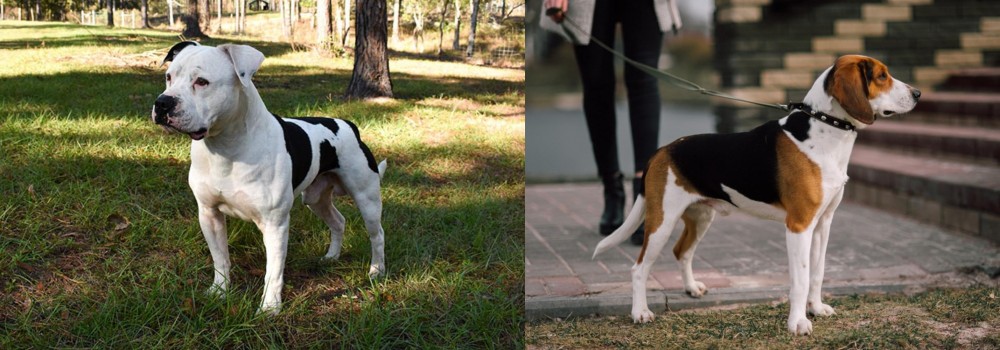 American Bulldog is originated from United States but Estonian Hound is originated from Estonia. American Bulldog may grow 18 cm / 8 inches higher than Estonian Hound. American Bulldog may weigh 34 kg / 75 pounds more than Estonian Hound. Both American Bulldog and Estonian Hound has almost same life span. American Bulldog may have more litter size than Estonian Hound. American Bulldog requires Low Maintenance. But Estonian Hound requires Moderate Maintenance
American Bulldog is originated from United States but Estonian Hound is originated from Estonia. American Bulldog may grow 18 cm / 8 inches higher than Estonian Hound. American Bulldog may weigh 34 kg / 75 pounds more than Estonian Hound. Both American Bulldog and Estonian Hound has almost same life span. American Bulldog may have more litter size than Estonian Hound. American Bulldog requires Low Maintenance. But Estonian Hound requires Moderate Maintenance
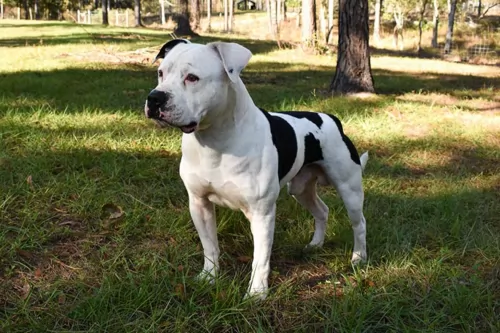 Following World War II, the American Bulldog was almost extinct.
Following World War II, the American Bulldog was almost extinct.
Thanks to John D. Johnson from Summerville, Georgia the breed is still with us today. He gathered the best dogs he could find throughout the rural South and bred them back into popularity among his family and other rural families. His father bred the American Bulldog before John did and they have bred them longer than any other in any part of the world. His dogs were regularly used for tracking, hunting, guarding, watchdog and weight pulling. At some point Alan Scott joined Johnson breeding other bulldogs to Johnson's and forming the Standard American Bulldog.
The American Bulldog/ is popular today as a family pet and companion as well as a working dog.
 In 1947, the Estonian Hound was developed and remains today the only pure breed ever developed in Estonia. At that time the national economic minister of the Soviet Union declared that every country in the USSR must have a national dog breed. Thus, the Estonian Hound and the Estonian Kennel Union were born. The Kennel Union is currently seeking breed recognition from the Federation Cynoloqique Internationale.
In 1947, the Estonian Hound was developed and remains today the only pure breed ever developed in Estonia. At that time the national economic minister of the Soviet Union declared that every country in the USSR must have a national dog breed. Thus, the Estonian Hound and the Estonian Kennel Union were born. The Kennel Union is currently seeking breed recognition from the Federation Cynoloqique Internationale.
The Estonian Hound came from breeding local Estonian hunting dogs with several different breeds of foreign dogs. The Soviet decree also established that hunting dogs had to be no more than 17 inches high. This result in a hunting dog with great agility and drive that is extremely popular in now inependent Estonia. It is the national dog.
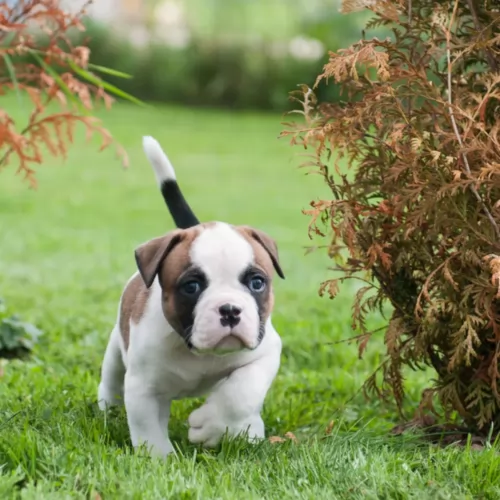 The American Bulldog is a powerful and muscular dog in a sturdy and compact frame. The female is more refined than the heavy boned and stocky male, but both genders are athletic, agile and quick. The have large heads, strong jaws, a muscular neck and with a moderately deep and wide chest.
The American Bulldog is a powerful and muscular dog in a sturdy and compact frame. The female is more refined than the heavy boned and stocky male, but both genders are athletic, agile and quick. The have large heads, strong jaws, a muscular neck and with a moderately deep and wide chest.
They have a square head, with muscular cheeks and a clearly defined furrow between his eyes. With broad, square and strong muzzles, they have a reverse scissors, scissors, moderate underbite and an even bite. Ears come in a variety of shapes and sizes and eyes can be any color as well. The nose however should be black and lips black as well. Their legs are strong, heavy boned and straight with well-defined muscles in the hindquarters. Finally ,they have a thick, low set tail that comes to a point at the end.
 The Estonian Hound is a strong, muscular body of medium size, with well-developed muscles and strong bones. It has a straight muzzle and skull with defined eyebrows and long drop ears. They have black noses and dark eyes. Their back is wide and straight, and their chest is deep and wide. They have skin that is tight with no wrinkles or folds anywhere.
The Estonian Hound is a strong, muscular body of medium size, with well-developed muscles and strong bones. It has a straight muzzle and skull with defined eyebrows and long drop ears. They have black noses and dark eyes. Their back is wide and straight, and their chest is deep and wide. They have skin that is tight with no wrinkles or folds anywhere.
The Estonian Hound is double coated, but the undercoat is not well developed. The top coat is rough, short and shiny. The tail has a thick covering of hair. The color is usually white with red patches, black or brown patches or yellow patches.
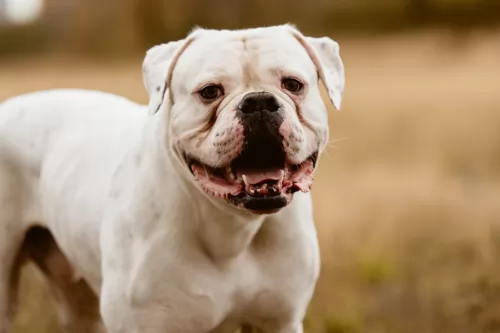 The American Bulldog is characteristically loyal, brave and reliable. It is a friendly, gentle dog that truly loves children. There is not a hostile bone in his body despite his history and reputation for bull baiting. Though he is protective of its family and affectionate with most, he still needs a human companion who is strong willed and a genuine pack leader. Without this he might become aggressive around other dogs and pets. They are immensely self-confident and they do slobber and drool and will become excited and hard to handle without daily exercise of both their body and their minds.
The American Bulldog is characteristically loyal, brave and reliable. It is a friendly, gentle dog that truly loves children. There is not a hostile bone in his body despite his history and reputation for bull baiting. Though he is protective of its family and affectionate with most, he still needs a human companion who is strong willed and a genuine pack leader. Without this he might become aggressive around other dogs and pets. They are immensely self-confident and they do slobber and drool and will become excited and hard to handle without daily exercise of both their body and their minds.
 The Estonian Hound is a happy dog and loves to play with children. He was bred to hunt though and he can get fixated on a scent and knock over a small child.
The Estonian Hound is a happy dog and loves to play with children. He was bred to hunt though and he can get fixated on a scent and knock over a small child.
He is a hunting dog with great agility and drive.
He has had to be adaptable through his short history and is now more a companion than a hunting dog. He can live in the city or country.
He is intelligent and trainable. He is lively and energetic and the challenge might be keeping his attention long enough to train.
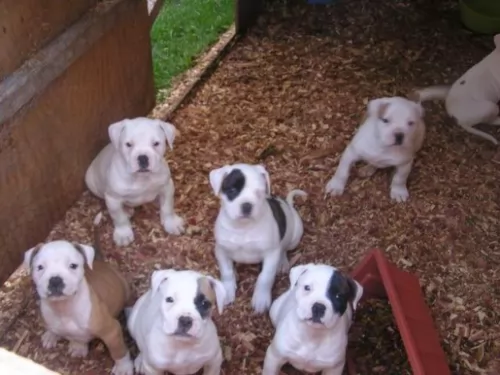 Though generally healthy, the American Bulldog is prone to a few problems.
Though generally healthy, the American Bulldog is prone to a few problems.
This is a serious issue in many breeds of dogs and is especially prevalent with the American Bull Dog. This may seem ironic in such a short legged dog but it is unfortunately very common. It is a genetic disorder that causes the bones in the joint to separate and causes the dog much pain and lameness.
Due to skin folds you need to be care and watch for irritation and infection in the folds. They are also prone to ear infections.
The American Bulldog is prone to overeating and all the health issues that presents. With short legs and a genetic predisposition to arthritis and hip dysplasia, obesity is a real health risk for your bulldog.
 With such a young breed there have not been any studies done on their health or genetic issues. It seems the breed is fairly healthy but there is too little information to really say. Being confined to Estonia there has been little commercial or backyard breeding. He is less likely than most pure breeds to have genetic issues.
With such a young breed there have not been any studies done on their health or genetic issues. It seems the breed is fairly healthy but there is too little information to really say. Being confined to Estonia there has been little commercial or backyard breeding. He is less likely than most pure breeds to have genetic issues.
It is likely that dogs of his type are at risk for:
Caused by excessive exercise before or after having eaten a large meal. It is suggested that you feed your English Setter twice a day, smaller meals and not right before or after strenuous exercise.
 Feed a high quality dry food made for puppies. Feed ¼ to ½ cup per day in 2-3 meals for the first six months.
Feed a high quality dry food made for puppies. Feed ¼ to ½ cup per day in 2-3 meals for the first six months.
Feed 1 to 2 cups in two meals from 6 months to a year or so.
Feed about 2 to 3 cups in two meals.
As previously mentioned this seems to be a fairly healthy breed.
Be careful not to feed a large meal before or after exercise due to possibility of bloat.
Check their ears and clean them periodically.
The Estonian Hound is a hunting dog and needs a good deal of exercise – at least an hour and a half every day or a long walk if not used for hunting. He is a working dog with a lot of energy and stamina. Don’t let him off leash though or he will follow his nose and take off. He is usually calm and quiet indoors if he gets enough physical and mental stimulation outdoors. He can be destructive and loud, nervous and hyper if he doesn’t. They enjoy Frisbee, agility, tracking and of course hunting.